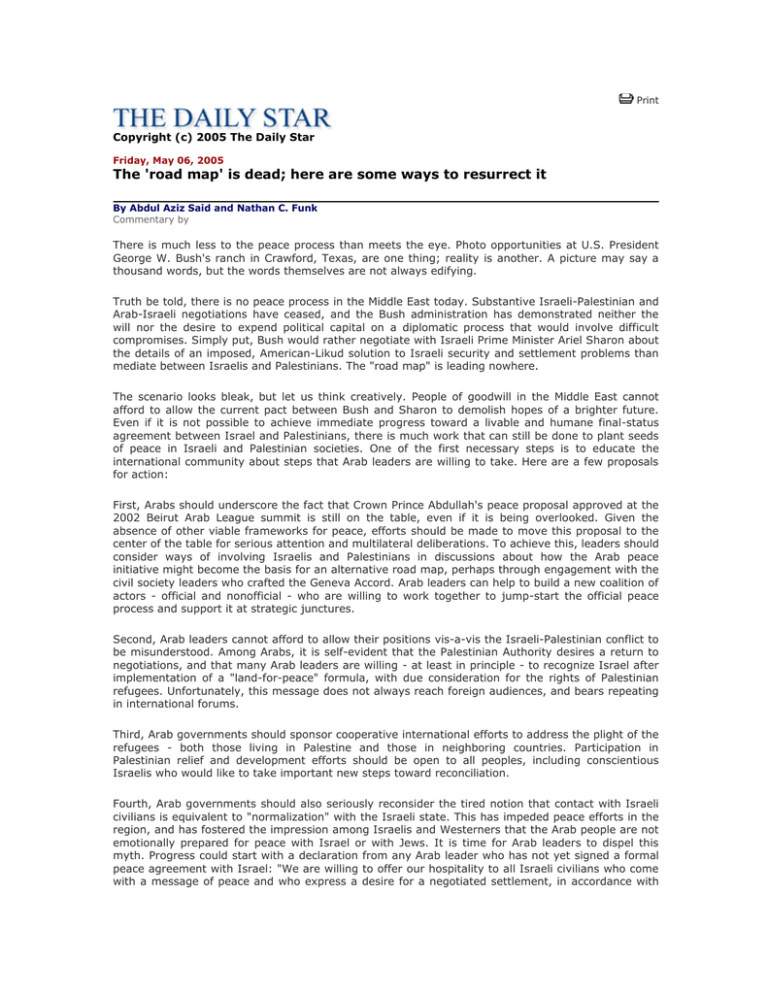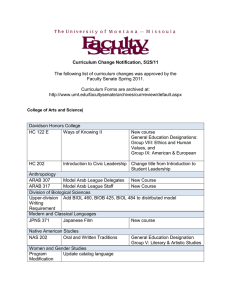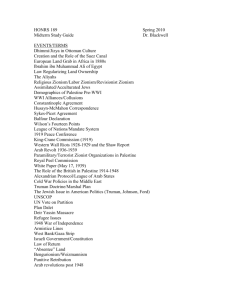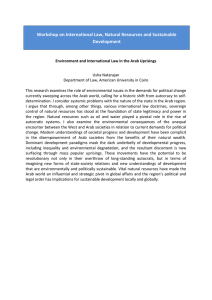The 'road map' is dead; here are some ways to...
advertisement

Print Copyright (c) 2005 The Daily Star Friday, May 06, 2005 The 'road map' is dead; here are some ways to resurrect it By Abdul Aziz Said and Nathan C. Funk Commentary by There is much less to the peace process than meets the eye. Photo opportunities at U.S. President George W. Bush's ranch in Crawford, Texas, are one thing; reality is another. A picture may say a thousand words, but the words themselves are not always edifying. Truth be told, there is no peace process in the Middle East today. Substantive Israeli-Palestinian and Arab-Israeli negotiations have ceased, and the Bush administration has demonstrated neither the will nor the desire to expend political capital on a diplomatic process that would involve difficult compromises. Simply put, Bush would rather negotiate with Israeli Prime Minister Ariel Sharon about the details of an imposed, American-Likud solution to Israeli security and settlement problems than mediate between Israelis and Palestinians. The "road map" is leading nowhere. The scenario looks bleak, but let us think creatively. People of goodwill in the Middle East cannot afford to allow the current pact between Bush and Sharon to demolish hopes of a brighter future. Even if it is not possible to achieve immediate progress toward a livable and humane final-status agreement between Israel and Palestinians, there is much work that can still be done to plant seeds of peace in Israeli and Palestinian societies. One of the first necessary steps is to educate the international community about steps that Arab leaders are willing to take. Here are a few proposals for action: First, Arabs should underscore the fact that Crown Prince Abdullah's peace proposal approved at the 2002 Beirut Arab League summit is still on the table, even if it is being overlooked. Given the absence of other viable frameworks for peace, efforts should be made to move this proposal to the center of the table for serious attention and multilateral deliberations. To achieve this, leaders should consider ways of involving Israelis and Palestinians in discussions about how the Arab peace initiative might become the basis for an alternative road map, perhaps through engagement with the civil society leaders who crafted the Geneva Accord. Arab leaders can help to build a new coalition of actors - official and nonofficial - who are willing to work together to jump-start the official peace process and support it at strategic junctures. Second, Arab leaders cannot afford to allow their positions vis-a-vis the Israeli-Palestinian conflict to be misunderstood. Among Arabs, it is self-evident that the Palestinian Authority desires a return to negotiations, and that many Arab leaders are willing - at least in principle - to recognize Israel after implementation of a "land-for-peace" formula, with due consideration for the rights of Palestinian refugees. Unfortunately, this message does not always reach foreign audiences, and bears repeating in international forums. Third, Arab governments should sponsor cooperative international efforts to address the plight of the refugees - both those living in Palestine and those in neighboring countries. Participation in Palestinian relief and development efforts should be open to all peoples, including conscientious Israelis who would like to take important new steps toward reconciliation. Fourth, Arab governments should also seriously reconsider the tired notion that contact with Israeli civilians is equivalent to "normalization" with the Israeli state. This has impeded peace efforts in the region, and has fostered the impression among Israelis and Westerners that the Arab people are not emotionally prepared for peace with Israel or with Jews. It is time for Arab leaders to dispel this myth. Progress could start with a declaration from any Arab leader who has not yet signed a formal peace agreement with Israel: "We are willing to offer our hospitality to all Israeli civilians who come with a message of peace and who express a desire for a negotiated settlement, in accordance with universal principles of equality and justice." Fifth, Arab leaders can make a statement affirming people-to-people contact in the cause of peace in conjunction with their announcement of an initiative honoring the late Israeli peacemaker Maxim Ghilan: namely, the founding of a "Brotherhood and Sisterhood of the Middle East Movement," to expand and deepen commitment to principles of regional peace, justice and coexistence. Sixth, to create venues giving life to such a movement, Arab governments or North American universities should host conferences for academic and civil society leaders committed to the idea of a new peace process. A major American university with experience in the field of peacemaking might provide an ideal venue. Invitees should include Israelis, Palestinians, non-Palestinian Arabs, and perhaps Iranians as well. If officially sponsored by an Arab leader, such a conference would have the potential to gain international media attention and catalyze debate about the need for negotiations. Seventh, Arab as well as Western governments should also consider providing funds to support university consortiums that would connect Palestinian, Israeli, Arab and Western universities for cooperative projects in all areas - including conflict-resolution education as well as technical fields. These consortiums should include major Israeli, Palestinian and Arab institutions such as Ben Gurion University, Bir Zeit University, and the American University in Cairo. Such consortiums might undertake projects of great practical and symbolic significance, such as the construction of economically viable and ecologically sustainable communities. Eighth, Arab and Western leaders should also consider jointly sponsoring a major international conference on Confidence and Security Building Measures (CSBMs) in the Greater Middle East. The purpose would be to draft a document outlining possibilities for a cooperative regional security system, to be developed through high-level dialogue and exchange among military leaders. Important lessons should be drawn from the role of CSBMs during the 1980s between the U.S. and the Soviet Union. There is still time for bold steps that will put new energy into the search for a positive Middle Eastern future. Let us all seek to embark on this new journey. Abdul-Aziz Said is Mohammad Said Farsi Professor of Islamic Peace at the American University in Washington. Nathan C. Funk is assistant professor of peace and conflict studies at Conrad Grebel University College, the University of Waterloo, Canada. They wrote this commentary for THE DAILY STAR. Copyright (c) 2005 The Daily Star


